Module 10 On the radio Unit 3 Language in use 课件(共33张PPT)
文档属性
| 名称 | Module 10 On the radio Unit 3 Language in use 课件(共33张PPT) |

|
|
| 格式 | zip | ||
| 文件大小 | 483.5KB | ||
| 资源类型 | 教案 | ||
| 版本资源 | 外研版 | ||
| 科目 | 英语 | ||
| 更新时间 | 2020-05-03 09:50:27 | ||
图片预览

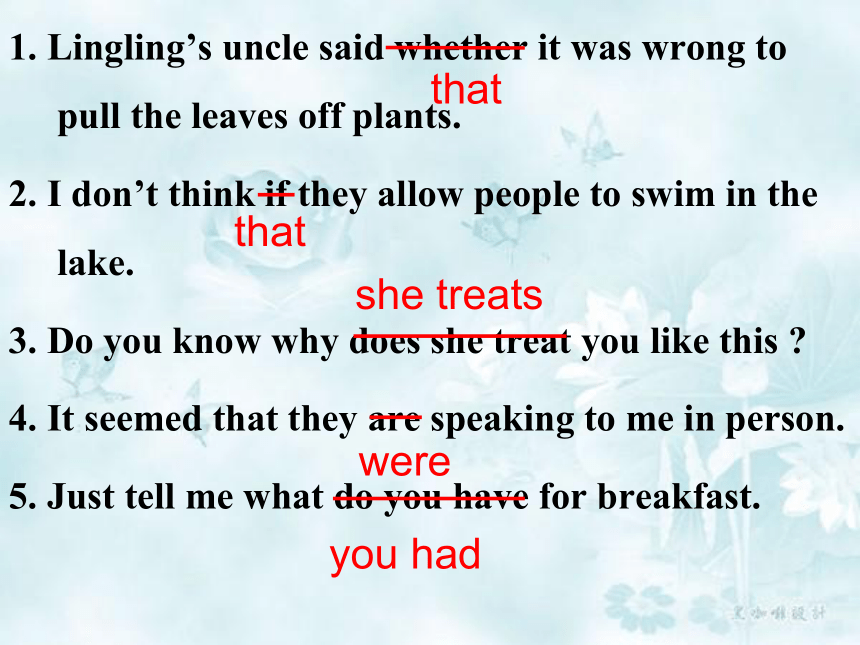
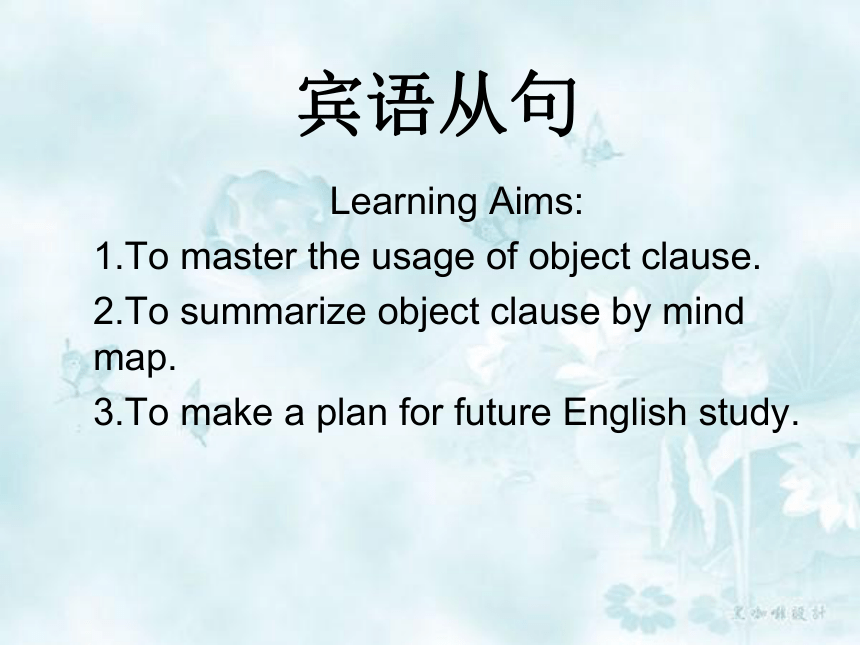
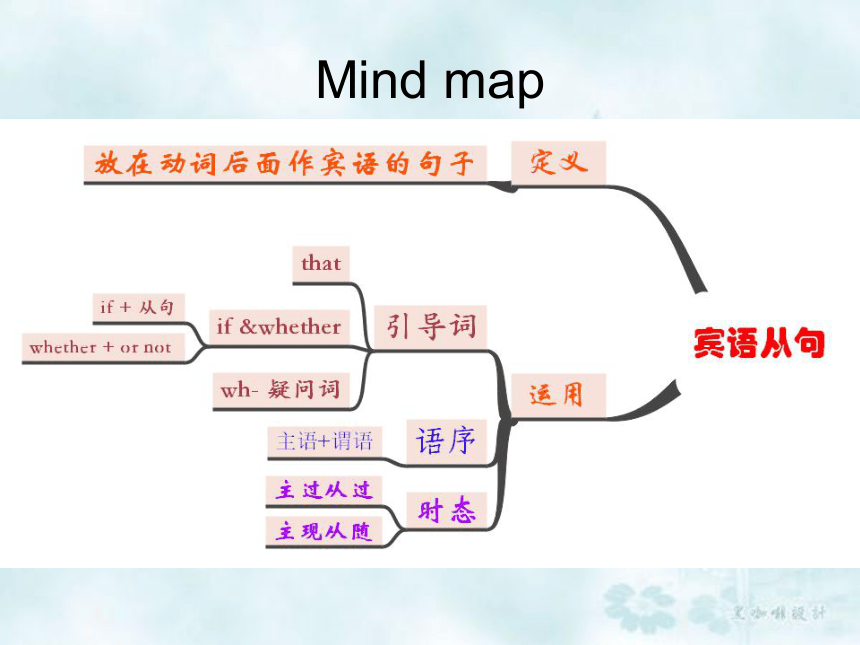
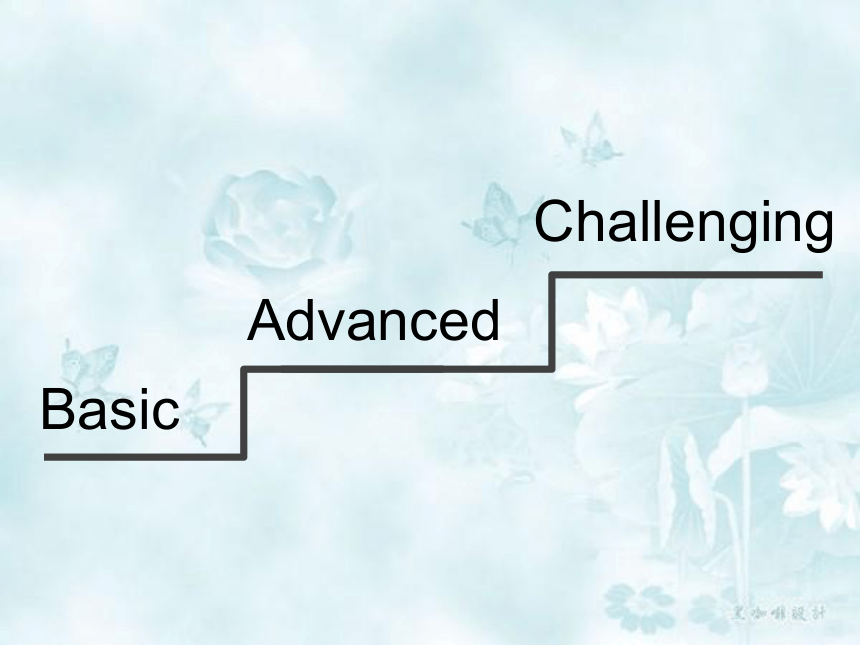
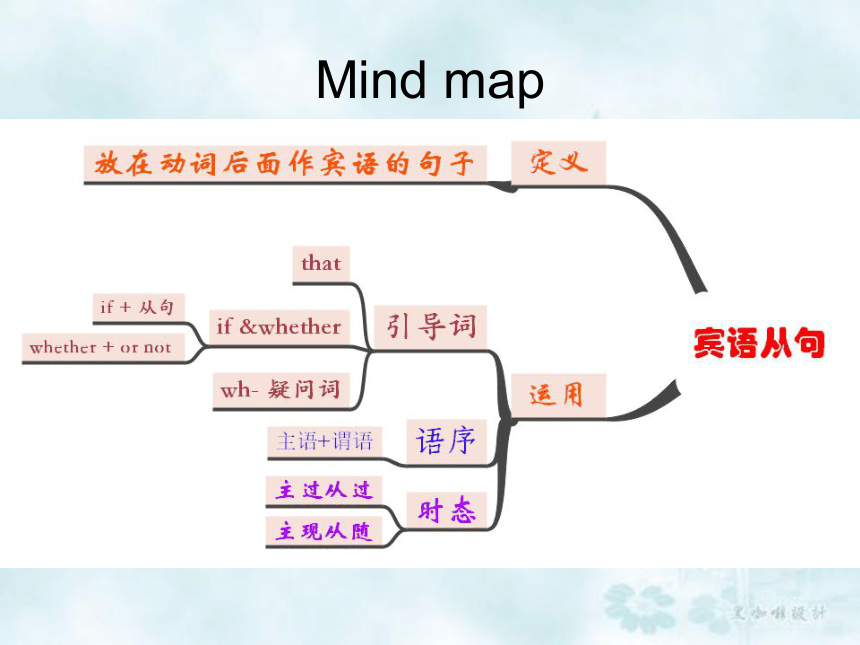
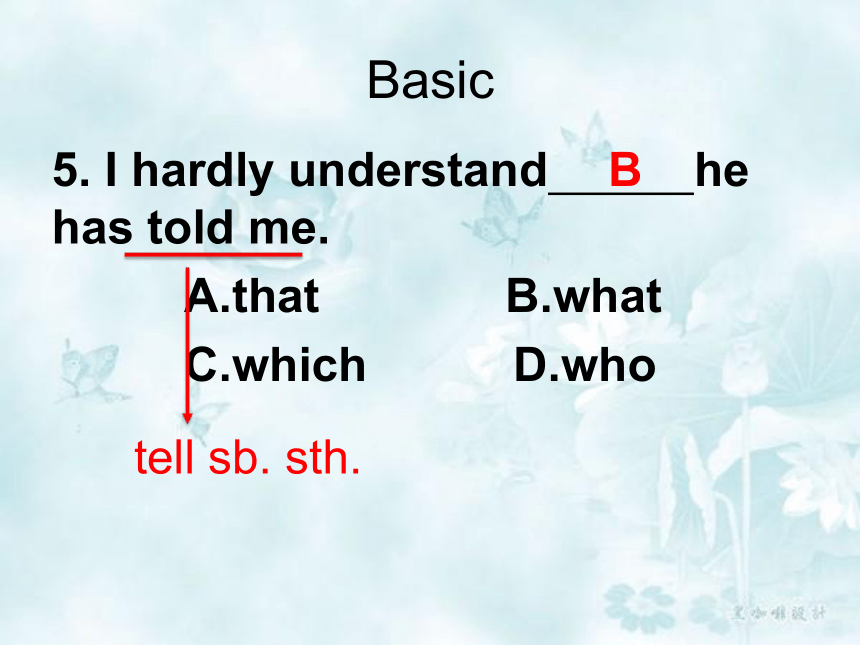
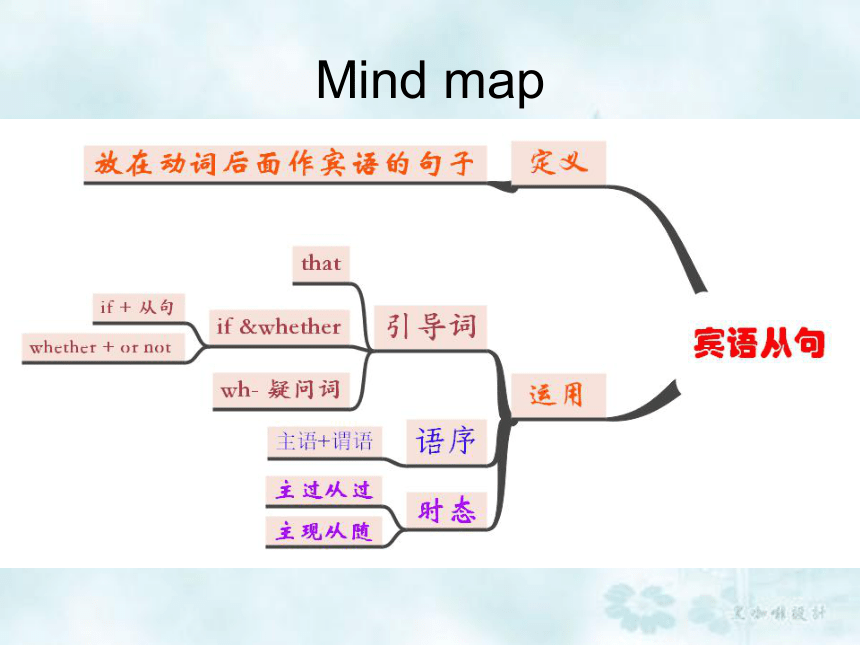
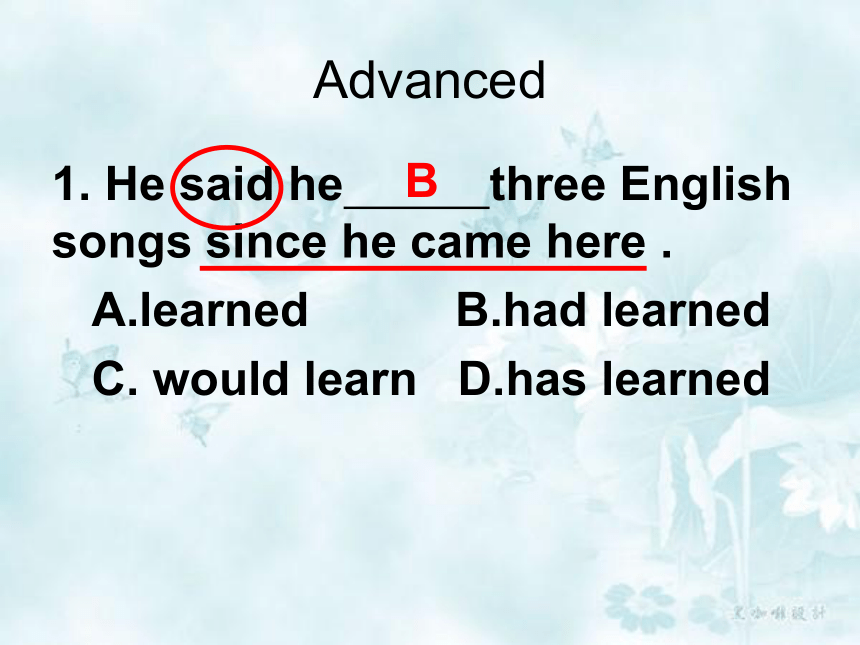
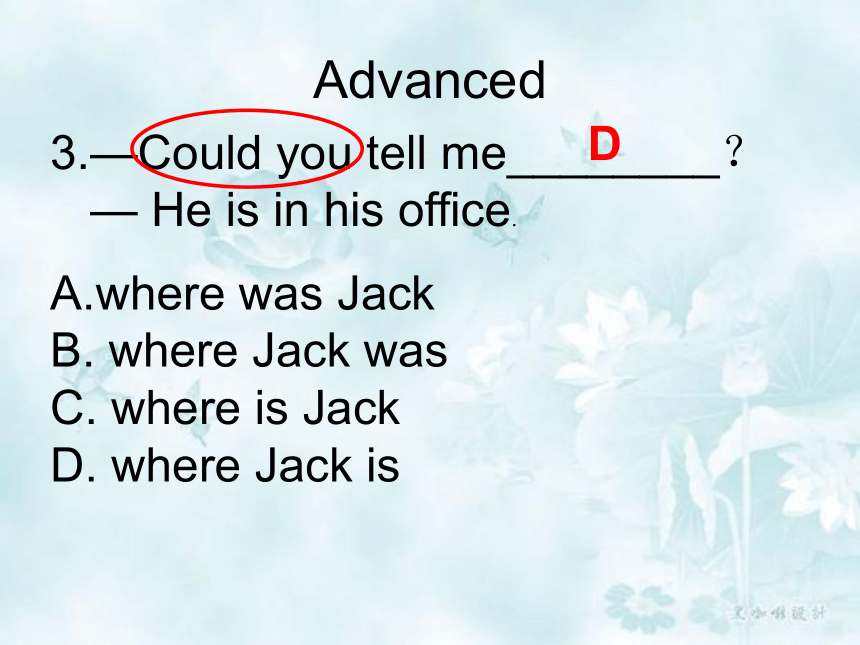
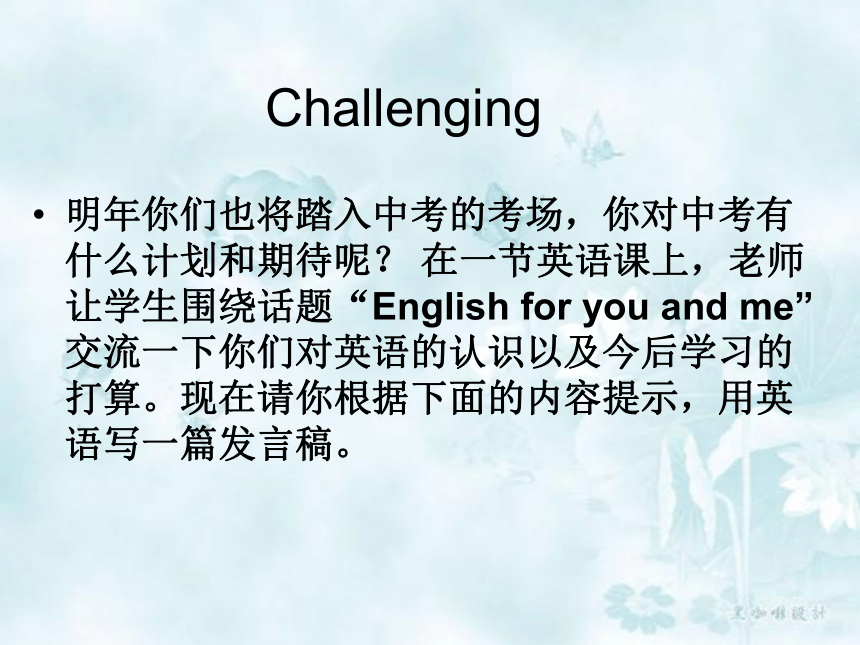
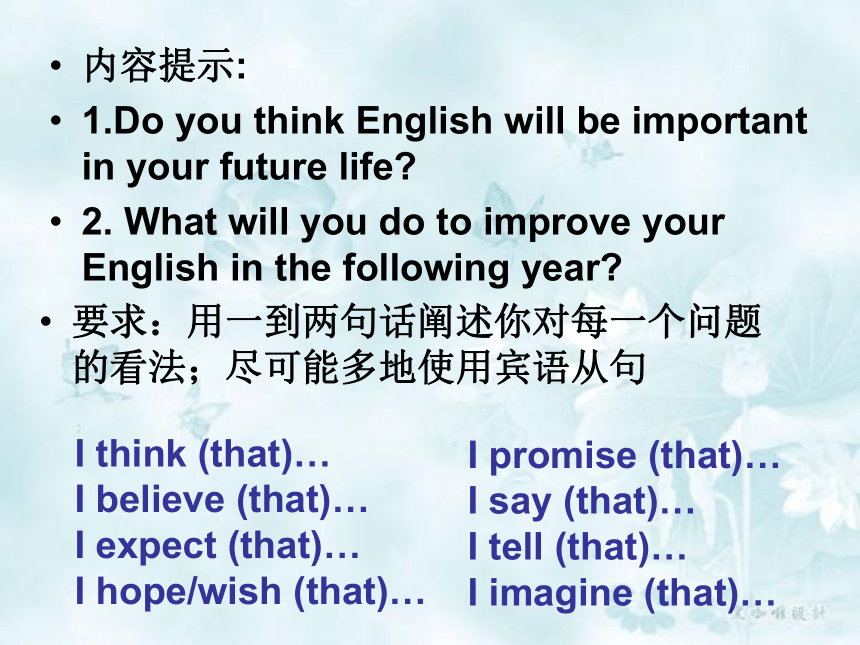
文档简介
(共33张PPT)
Welcome to my class!
1. Lingling’s uncle said whether it was wrong to pull the leaves off plants.
2. I don’t think if they allow people to swim in the lake.
3. Do you know why does she treat you like this ?
4. It seemed that they are speaking to me in person.
5. Just tell me what do you have for breakfast.
that
that
she treats
were
you had
宾语从句
Learning Aims:
To master the usage of object clause.
To summarize object clause by mind map.
To make a plan for future English study.
Mind map
Basic
Advanced
Challenging
Mind map
Basic
5. I hardly understand he has told me.
A.that B.what
C.which D.who
B
Mind map
Advanced
1. He said he three English songs since he came here .
A.learned B.had learned
C. would learn D.has learned
B
Advanced
D
3.—Could you tell me________?
— He is in his office.
A.where was Jack
B. where Jack was
C. where is Jack
D. where Jack is
Challenging
明年你们也将踏入中考的考场,你对中考有什么计划和期待呢? 在一节英语课上,老师让学生围绕话题“English for you and me”交流一下你们对英语的认识以及今后学习的打算。现在请你根据下面的内容提示,用英语写一篇发言稿。
要求:用一到两句话阐述你对每一个问题的看法;尽可能多地使用宾语从句
内容提示:
1.Do you think English will be important in your future life?
2. What will you do to improve your English in the following year?
Homework
Finish the writing ( about 80 words)
How to use the present perfect tense properly?
现在完成时的意义 现在完成时的基本句型
过去分词的变化 现在完成时的运用
现在完成时的两种用法
1.表示发生在过去的动作对现在造成的结果和影响。
2.动作发生在过去,并且一直延续到现在,甚至有可能延续下去。
现在完成时的基本句型
1、肯定式:have/has+ done
2、否定式:have/has +not +done
3、一般疑问式:
have/has +主语+done
现在完成时基本句型的例句
1. I have cleaned my room.
2. He hasn’t finished his homework.
3. Have you read this novel?
4. We have studied English for two years.
5. They haven’t seen each other since 1998.
6. Has he gone to the library?
按要求改写下列句子。
1.We have visited the museum.(改为一般疑问句)
2.They have seen the film.(改为否定句)
3.He has returned the book.(对划线部分提问)
1.We have visited the museum.(改为一般疑问句)
Have you visited the museum?
2.They have seen the film.(改为否定句)
They have not (haven’t) seen the film.
3.He has returned the book.(对划线部分提问)
What has he returned ?
不规则变化
过去分词的变化
规则变化
1. I have caught a bad cold.
2. He hasn’t finished his homework.
3. Have you drunk coca cola?
We have studied English for two years.
Has he gone to the library?
Children have already forgotten this story.
He has brought his new books.
The competition has already begun.
I have studied here since 2017.
1. The TV Tower _______ tens of thousands of visitors since 1995.
A. attracted??? B. attracts?
C. has attracted?? D. will attract?
2. —How long _______ you _____ here? ???
—For about two years so far.?
A. have, studied?? B. did, live?
C. do, stay???????? D. were, swimming
现在完成时的运用
运用一
for+一段时间;
since+点时间(since作连词后接从句时,该从句要用一般过去时) ;
1.—What are you going to do this weekend? ???
—I _______ yet.?
A. haven’t decided?? B. won’t decide
C. have decided ?? D. didn’t decide
2. It ___ ten years since we last ____ in Beijing.
A. was, met?? ??? B. has been, met?
C. was, meet ???? ? D. is, meet
运用二
(1) 现在完成时的副词:
yet, already, never, lately, recently, ever, just, before, (ever) since,____,____,_______等。
(2) 句型:
It has been + 段时间+since + 过去时. ?
1. —Is that Jack speaking?
??? —Sorry, he isn’t in right now. He _____ the cinema with his aunt.
A. has been to??? ? ?B. has gone to
C. have been to ??? ?D. have gone to
2. —How many times _______ you _______ to Beijing this year? ??? —Three times.
A. have, been ???? ?B. had, been
C. have, gone???? ? ?D. had gone
运用三
have been to 曾经去过某处(现在已经不在那个地方,强调以前的经历)
have gone to去了某处(强调主语已经离开说话者所在的地方,现在还没有回来) ?
1. —Oh, Mrs. King, your dress looks nice. Is it new?
??? —No, I _______ it since two years ago.?
A. had???? B. bought ??
C. have had?? D. have bought
2. Tom _______ the CD player for two weeks.
A. has lent???? B. has borrowed
C. has bought ? D. has had
运用四
延续性动词是指那些动作可以持续的动词。如:have, keep, study, live, teach等。
非延续性动词是指那些动作瞬间完成的动词。如:begin, buy, borrow, lend等。
将非延续性动词转化为相应的延续动词。
How to use the present perfect tense properly?
现在完成时的意义 现在完成时的基本句型
过去分词的变化 现在完成时的运用
现在完成时的基本句型
1、肯定式:have/has+ done
2、否定式:have/has +not +done
3、一般疑问式:have/has +主语+done
for+一段时间;
since+点时间
have been to
have gone to
延续性动词是指那些动作可以持续的动词。如:have, keep, study, live, teach等。
非延续性动词是指那些动作瞬间完成的动词。如:begin, buy, borrow, lend等。
Welcome to my class!
1. Lingling’s uncle said whether it was wrong to pull the leaves off plants.
2. I don’t think if they allow people to swim in the lake.
3. Do you know why does she treat you like this ?
4. It seemed that they are speaking to me in person.
5. Just tell me what do you have for breakfast.
that
that
she treats
were
you had
宾语从句
Learning Aims:
To master the usage of object clause.
To summarize object clause by mind map.
To make a plan for future English study.
Mind map
Basic
Advanced
Challenging
Mind map
Basic
5. I hardly understand he has told me.
A.that B.what
C.which D.who
B
Mind map
Advanced
1. He said he three English songs since he came here .
A.learned B.had learned
C. would learn D.has learned
B
Advanced
D
3.—Could you tell me________?
— He is in his office.
A.where was Jack
B. where Jack was
C. where is Jack
D. where Jack is
Challenging
明年你们也将踏入中考的考场,你对中考有什么计划和期待呢? 在一节英语课上,老师让学生围绕话题“English for you and me”交流一下你们对英语的认识以及今后学习的打算。现在请你根据下面的内容提示,用英语写一篇发言稿。
要求:用一到两句话阐述你对每一个问题的看法;尽可能多地使用宾语从句
内容提示:
1.Do you think English will be important in your future life?
2. What will you do to improve your English in the following year?
Homework
Finish the writing ( about 80 words)
How to use the present perfect tense properly?
现在完成时的意义 现在完成时的基本句型
过去分词的变化 现在完成时的运用
现在完成时的两种用法
1.表示发生在过去的动作对现在造成的结果和影响。
2.动作发生在过去,并且一直延续到现在,甚至有可能延续下去。
现在完成时的基本句型
1、肯定式:have/has+ done
2、否定式:have/has +not +done
3、一般疑问式:
have/has +主语+done
现在完成时基本句型的例句
1. I have cleaned my room.
2. He hasn’t finished his homework.
3. Have you read this novel?
4. We have studied English for two years.
5. They haven’t seen each other since 1998.
6. Has he gone to the library?
按要求改写下列句子。
1.We have visited the museum.(改为一般疑问句)
2.They have seen the film.(改为否定句)
3.He has returned the book.(对划线部分提问)
1.We have visited the museum.(改为一般疑问句)
Have you visited the museum?
2.They have seen the film.(改为否定句)
They have not (haven’t) seen the film.
3.He has returned the book.(对划线部分提问)
What has he returned ?
不规则变化
过去分词的变化
规则变化
1. I have caught a bad cold.
2. He hasn’t finished his homework.
3. Have you drunk coca cola?
We have studied English for two years.
Has he gone to the library?
Children have already forgotten this story.
He has brought his new books.
The competition has already begun.
I have studied here since 2017.
1. The TV Tower _______ tens of thousands of visitors since 1995.
A. attracted??? B. attracts?
C. has attracted?? D. will attract?
2. —How long _______ you _____ here? ???
—For about two years so far.?
A. have, studied?? B. did, live?
C. do, stay???????? D. were, swimming
现在完成时的运用
运用一
for+一段时间;
since+点时间(since作连词后接从句时,该从句要用一般过去时) ;
1.—What are you going to do this weekend? ???
—I _______ yet.?
A. haven’t decided?? B. won’t decide
C. have decided ?? D. didn’t decide
2. It ___ ten years since we last ____ in Beijing.
A. was, met?? ??? B. has been, met?
C. was, meet ???? ? D. is, meet
运用二
(1) 现在完成时的副词:
yet, already, never, lately, recently, ever, just, before, (ever) since,____,____,_______等。
(2) 句型:
It has been + 段时间+since + 过去时. ?
1. —Is that Jack speaking?
??? —Sorry, he isn’t in right now. He _____ the cinema with his aunt.
A. has been to??? ? ?B. has gone to
C. have been to ??? ?D. have gone to
2. —How many times _______ you _______ to Beijing this year? ??? —Three times.
A. have, been ???? ?B. had, been
C. have, gone???? ? ?D. had gone
运用三
have been to 曾经去过某处(现在已经不在那个地方,强调以前的经历)
have gone to去了某处(强调主语已经离开说话者所在的地方,现在还没有回来) ?
1. —Oh, Mrs. King, your dress looks nice. Is it new?
??? —No, I _______ it since two years ago.?
A. had???? B. bought ??
C. have had?? D. have bought
2. Tom _______ the CD player for two weeks.
A. has lent???? B. has borrowed
C. has bought ? D. has had
运用四
延续性动词是指那些动作可以持续的动词。如:have, keep, study, live, teach等。
非延续性动词是指那些动作瞬间完成的动词。如:begin, buy, borrow, lend等。
将非延续性动词转化为相应的延续动词。
How to use the present perfect tense properly?
现在完成时的意义 现在完成时的基本句型
过去分词的变化 现在完成时的运用
现在完成时的基本句型
1、肯定式:have/has+ done
2、否定式:have/has +not +done
3、一般疑问式:have/has +主语+done
for+一段时间;
since+点时间
have been to
have gone to
延续性动词是指那些动作可以持续的动词。如:have, keep, study, live, teach等。
非延续性动词是指那些动作瞬间完成的动词。如:begin, buy, borrow, lend等。
同课章节目录
- Module 1 Feelings and impressions
- Unit 1 It smells delicious.
- Unit 2 I feel nervous when I speak Chinese .
- Unit 3 Language in use
- Module 2 Experiences
- Unit 1 I've also entered lots of speaking competi
- Unit 2 They have seen the Pyramids.
- Unit 3 Language in use
- Module 3 Journey to space
- Unit 1 Has it arrived yet?
- Unit 2 We have not found life on any other planet
- Unit 3 Language in use
- Module 4 Seeing the docto
- Unit 1 I haven't done much exercise since I got m
- Unit 2 We have played football for a year now
- Unit 3 Language in use
- Module 5 Cartoons
- Unit 1 It's time to watch a cartoon.
- Unit 2 Tintin has been popular for over eighty yea
- Unit 3 Language in use
- Revision module A
- Module 6 Hobbies
- Unit 1 Do you collect anything ?
- Unit 2 Hobbies can make you grow as a person.
- Unit 3 Language in use
- Module 7 Summer in Los Angeles
- Unit 1 Please write to me and send me some photos
- Unit 2 Fill out a form and come to learn English
- Unit 3 Language in use
- Module 8 Time off
- Unit 1 I can hardly believe we are in the city ce
- Unit 2 We thought somebody was moving about
- Unit 3 Language in use
- Module 9 Friendship
- Unit 1 Could I ask if you've mentioned this to he
- Unit 2 I believe that the world is what you think
- Unit 3 Language in use
- Module 10 On the radio
- Unit 1 I hope that you can join us one day
- Unit 2 It seemed that they were speaking to me in
- Unit 3 Language in use
- Revision module B
